How did Donald Trump make his fortune?
- Published
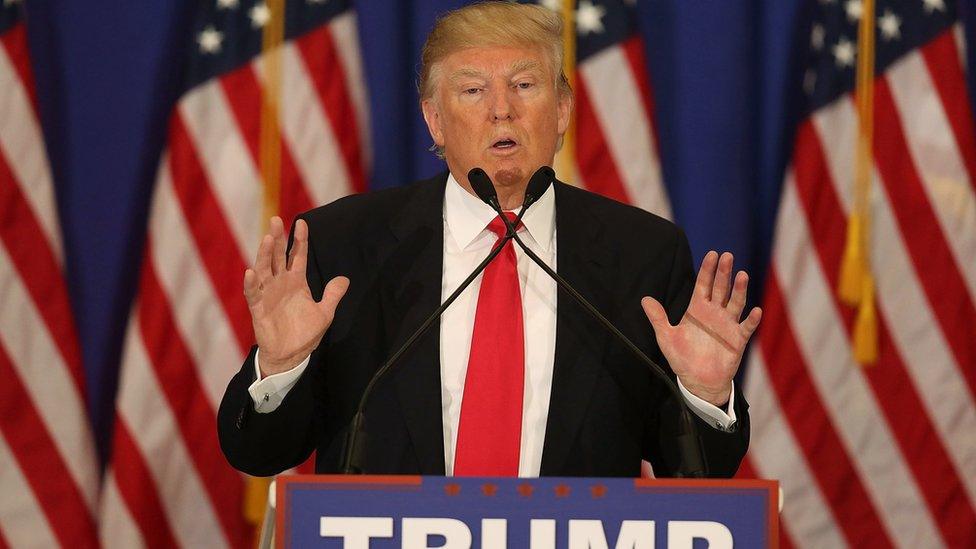
Republican presidential front-runner and billionaire businessman Donald Trump loves to talk about his money.
He has told supporters "I am really rich" and "I've always been good at making money".
Mr Trump values his net worth at more than $10bn (£7bn) though this has been disputed. However, exactly how much he is worth is unclear.
Those organisations that have looked at his finances have come up with widely differing figures.
According to Forbes his net worth is $4.5bn, Wealth-X says it is $4.4bn, while Bloomberg Billionaire's index says it is just $2.9bn.
Mr Trump dismisses all these lower figures, saying he's "worth much more". The main reason for these widely differing numbers is that so much of his business holdings are private.
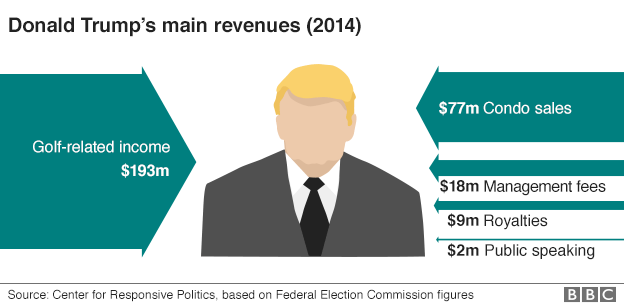
Father's legacy
In October, the front-runner told voters that his father gave him a "small loan" of $1m to get started.
Trump not only got his financing but his business style from his father.
Fred Trump started a million dollar residential real estate business in Brooklyn and Queens. He was known for building quality - many of his buildings are still standing - and pinching every penny possible.
He typically came under-budget on government funded projects and pocketed the difference as a profit - a practice that though legal, got him called before Congress.
"Fred Trump never saw a tax [break] he didn't take advantage of and Donald was at his elbow learning," says Gwenda Blair, author of The Trumps.
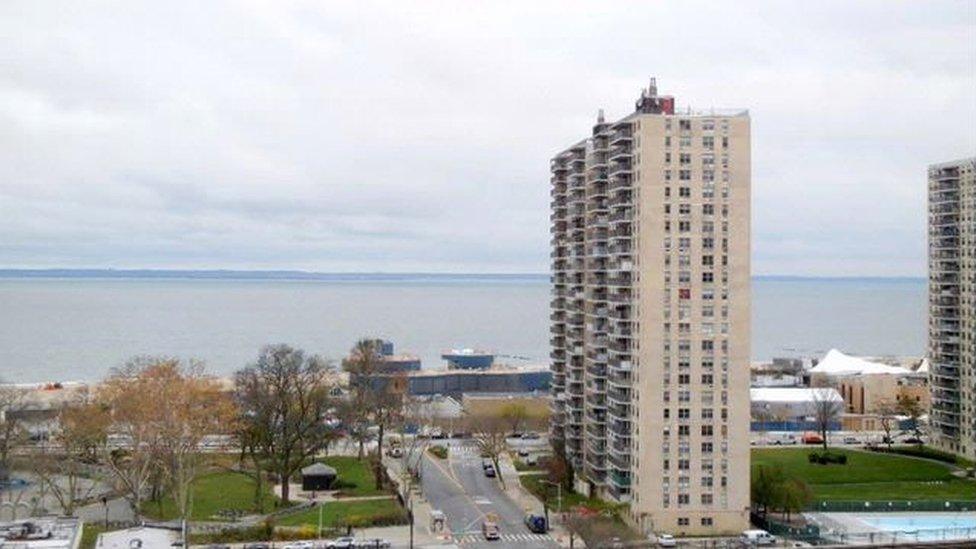
Trump Village in Coney Island Brooklyn opened in 1964 - built by Donald Trump's father Fred Trump
While Donald Trump claims it was his decision to switch from building low-income housing in New York's outer-boroughs to luxury towers in Manhattan, Ms Blair says the candidate's father was the likely force behind the move.
"Donald Trump relied on his father's resources. He needed his father to co-sign his loans and relied on his banking and political connections," says Ms Blair.
Real estate
Mr Trump's first big project was the Commodore Hotel, which he partnered with the Hyatt Organization to buy in 1976 for an undisclosed price, and renamed the Grand Hyatt.
At the time many buildings in Manhattan were facing foreclosure; the Commodore itself owed $1.5m in debt and New York was not seen as the luxury vacation spot it is today. The investment was a big risk for the young developer.
Using the negotiating skills he talks about so shamelessly on the campaign trail, Mr Trump convinced New York City to give the hotel a 40-year tax break that saved $160m. In 1996 he sold his half of the hotel to Hyatt for $142m.
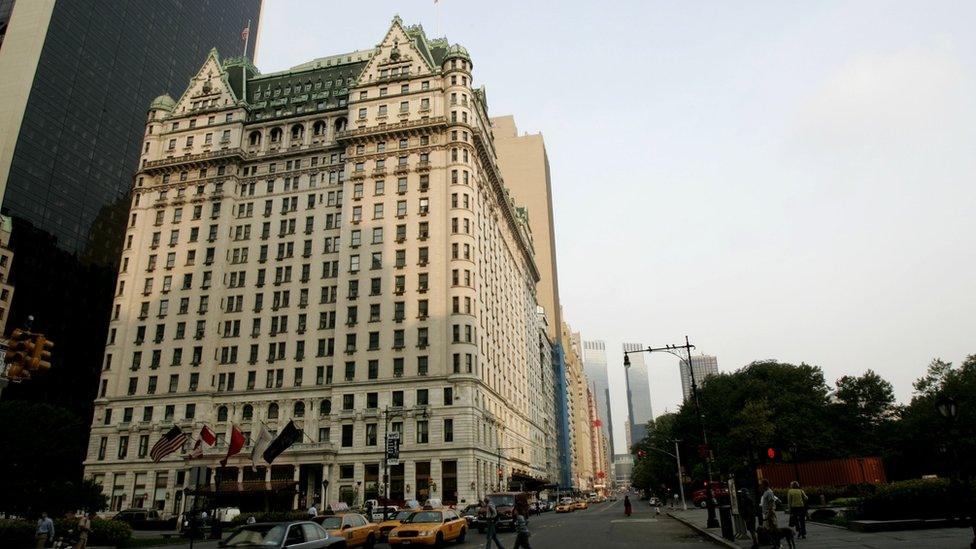
Trump bought the New York Plaza Hotel in 1988, in 1992 the hotel filed for bankruptcy and Trump lost half his ownership
He would continue to invest in and develop grand New York buildings, including buying the Plaza Hotel and and the former Bank of Manhattan building.
The company's crown jewel is the 58-floor Trump Tower on Fifth Avenue, completed in 1983. The building is still the headquarters for the Trump Organization and Mr Trump and his family live on the building's top floors.
Barbra Res, who served as the head of Trump Tower construction, recalls in an article for the New York Daily News, external, how Mr Trump was once "totally approachable and accessible".
Over time though, she says he increasingly needed "to be coddled and agreed with".
Building a brand
Donald Trump may claim to be a real estate mogul, but the bulk of his net worth comes from his brand value, which he began building in the 1980s.
The young businessman did regular TV interviews and was vocal during the 1988 Republican primaries.
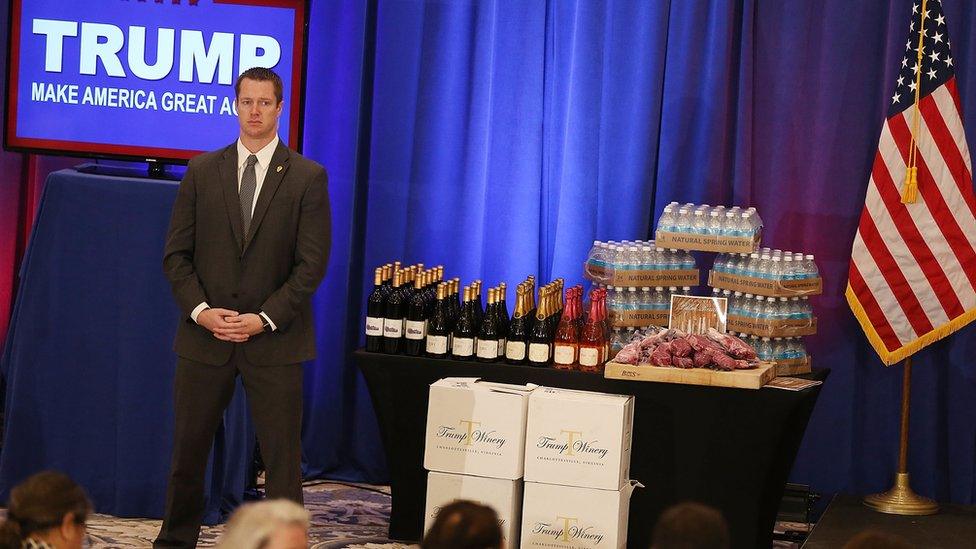
Part of what has helped grow the Trump brand is Mr Trump's willingness to stick his name on everything from steaks to ties
In the 1980s the Trump Organization began to licence the Trump name to other companies, accelerating its prominence globally.
Today, many Trump brands pay licensing fees to use the name and are not owned by Trump Organization - including the Trump Ocean Club and Trump Fine Foods.
In 1987, when he published The Art of the Deal his celebrity climbed even higher.
Mr Trump solidified his reputation as a straight-talking negotiator with his decade-long run as the host of The Apprentice, where his crass remarks and public firing of potential employees, often on an apparent whim, earned him legions of fans.
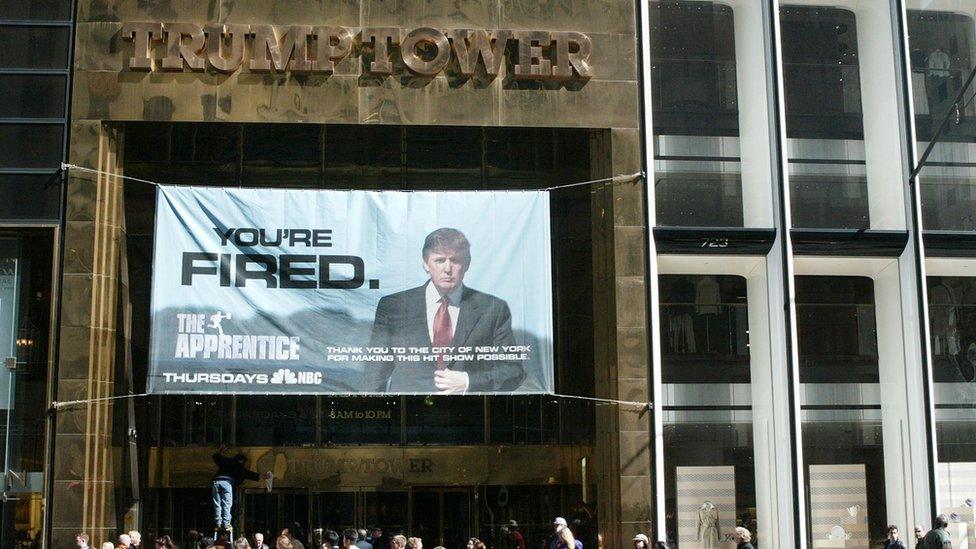
Donald Trump's wealth is closely tied to the value of his personal brand
Business attitude
Like his father, Mr Trump has a reputation for saving every penny possible.
He has called it a smart business move to withhold payments on contracts when he does not like the work, forcing the other side to negotiate a lower rate. He told Reuters , externalhe renegotiates contracts 10% to 15% of the time.
"I fight like hell to pay as little as possible," he said.
Mr Trump's "fight like hell" style has led to several well publicised legal battles. He is facing a lawsuit over Trump University and has been sued in the past by a former employee and union pension funds.
He has also used lawsuits as a tool. He sued a former Miss USA contestant for criticising the pageant he owned. He sued Deutsche Bank for refusing to give him a loan extension on a building project in Chicago.

Wollman rink in Central Park is managed by the Trump Organization
Despite these battles he is often praised for his business sense.
Speaking on BBC Radio 4 Piers Morgan called Mr Trump a "smart guy".
"I think from a business perspective he runs pretty good businesses and he tends to put very smart people in charge in of them," says Mr Morgan.
Activist investor Carl Icahn - who Mr Trump has suggested would make a good treasury secretary - has said the front-runner is "a very open-mined guy".
"He's got a strong ego, he believes in himself and he's willing to listen," says Mr Icahn.
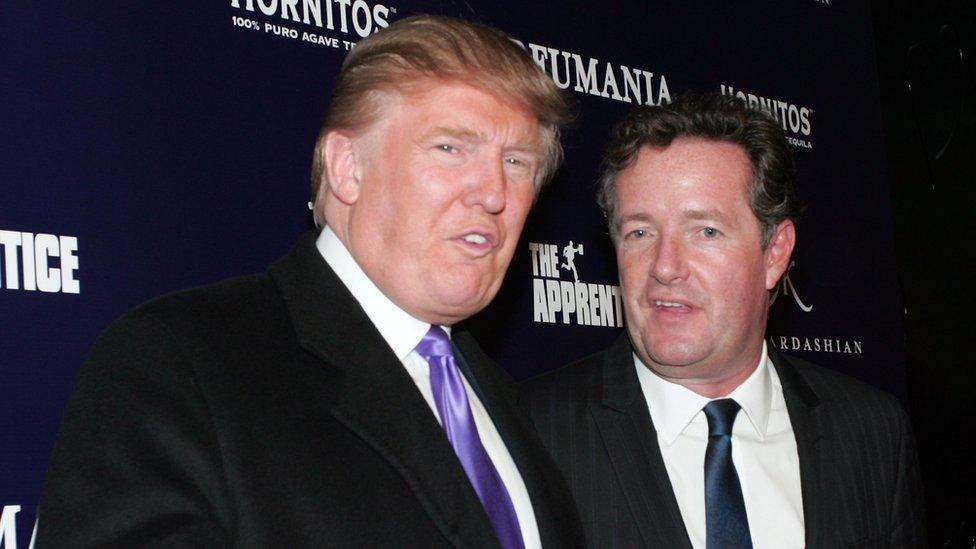
Piers Morgan was the winner of Celebrity Apprentice
Mr Icahn took over Trump Entertainment in 2009 when the company filed for bankruptcy, forcing Mr Trump to give up all of his investment in his Atlantic City casinos.
Corporate law
Mr Trump is no stranger to the legal system.
"I used the law four times and made a tremendous thing," he said during a debate.
By the 1990s, Mr Trump and his companies had clocked up close to $3.5bn in debt. His organization has forced lenders to cut its debt on four occasions over the last three decades.
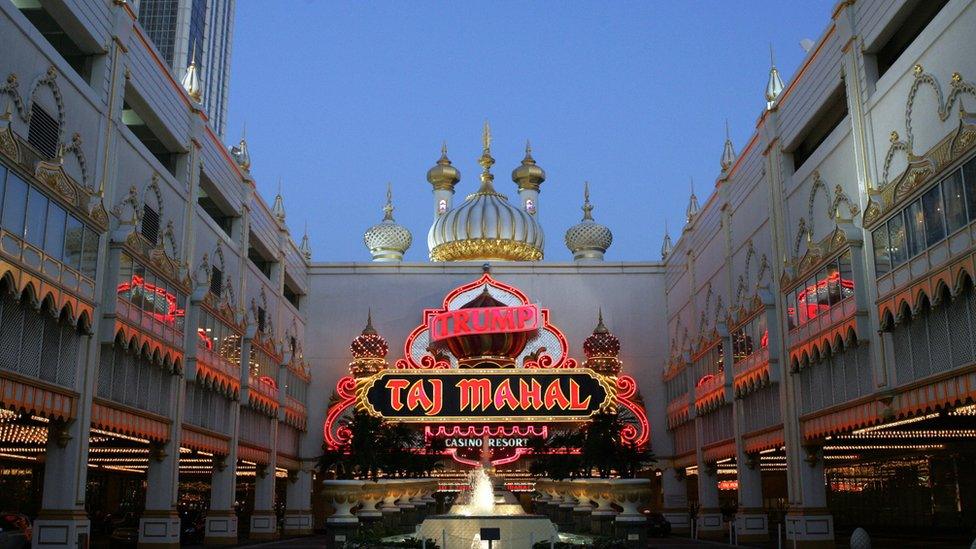
The Trump Taj Mahal filed for bankruptcy in 1991 and cost Mr Trump most of his stake in the casino as well as his airline and his yacht
Often the biggest concession was that Mr Trump give up part or all of his ownership, while the properties kept the Trump name - preserving the brand.
The only time Mr Trump has been personally on the line was in 1991 with the bankruptcy of the Trump Taj Mahal casino in Atlantic City.
He was responsible for $900m of the nearly $3bn debt owned by the casino and was forced to give up half his ownership in the company, and sell his airline and yacht.
Foreign ownership
Mr Trump's dealings outside the US can be as controversial as his campaign rhetoric. He has called the Chinese cheats but brought in Chinese investors to help finance his project on New York's west side rail yards. Mr Trump and his investors eventually sold that land for $1.8bn.
He says he loves Scotland - where his mother was born and where he owns several golf courses - but criticised the Scottish government and UK courts for allowing a wind farm to be build within view of his Balmedie golf course in Aberdeenshire.
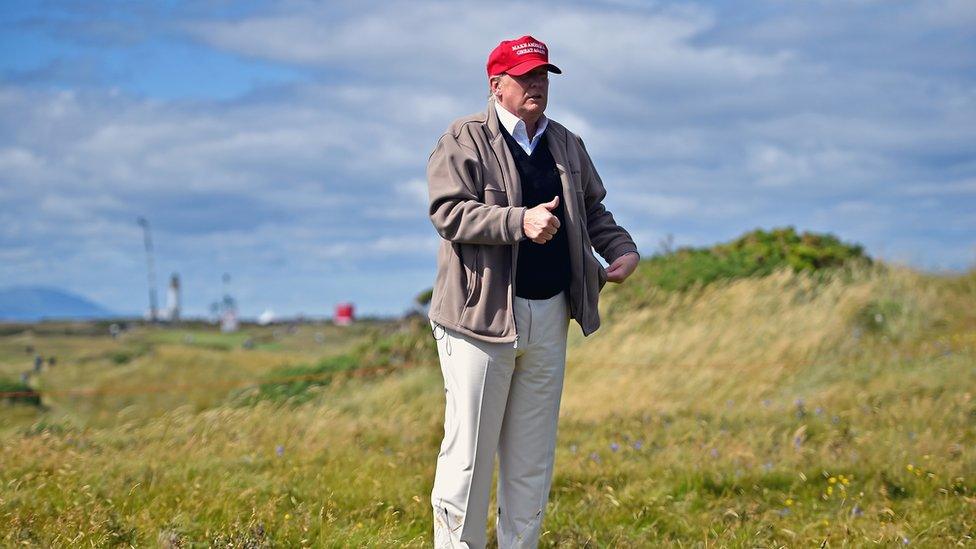
Donald Trump at his Turnberry golf course in South Ayrshire, Scotland, which he bought in 2014
The Trump Ocean Resort Baja Mexico was forced to settle a lawsuit with investors who spent out millions to buy condos or apartments that were never built.
As the controversy around the failed resort rose, Donald Trump pointed out the developers licensed his name and he was not responsible for the resort, despite appearing in advertising material.
Mr Trump has also been criticised for allowing the clothing brand that licenses his name to import products from Mexico, while railing against other companies that import goods to the US.
Success
Part of what has made the Trump Organization so successful is Mr Trump's willingness to stick his name on anything from buildings to steaks to ties.
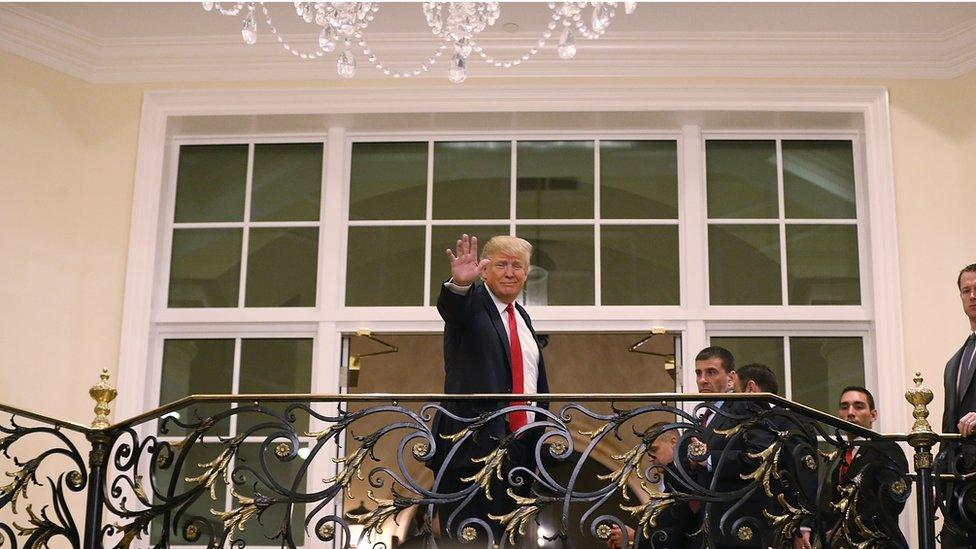
Despite losing in Wisconsin, Mr Trump remains the Republican front-runner
Forbes awarded Donald Trump five out of 10 on its self-made scale, a number the publication says indicates that he "inherited a small or medium-size business and made it into a ten-digit fortune".
Provided Mr Trump can keep his name synonymous with wealth and winning many of his business lines should do fine, but it is unclear what his bid for president will do to that image.